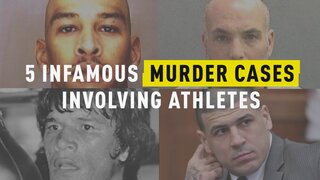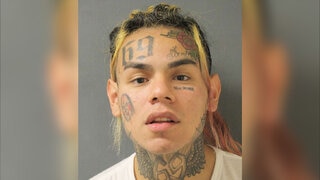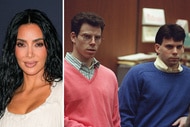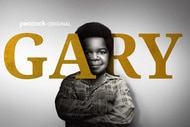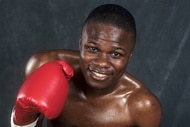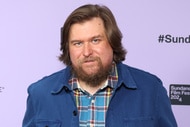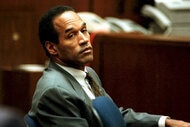Create a free profile to get unlimited access to exclusive videos, breaking news, sweepstakes, and more!
The First Scandal That Ever Shook Hollywood: The Mysterious Death Of Virginia Rappe
Roscoe "Fatty" Arbuckle was arrested in connection with the Hollywood actress' death, though he was later acquitted.
Virginia Rappe was a silent film actress who had a prominent role in Paradise Garden in 1917 — but she was just as well known for her sensationalized and mysterious death. Her death marked one of Hollywood’s first scandals when one of its biggest stars Roscoe "Fatty" Arbuckle was charged in connection to it. Just that year he was paid $3 million by Paramount Pictures to star in more movies. That’s a lot of money for 2018 — just imagine how far that went in 1917!
Though the actors were beloved by audiences at the time, more than a century later, Rappe and Arbuckle are not remembered for their films. Instead, their names are forever associated with murder and scandal following a fateful Labor Day party that resulted in Rappe's death.
RELATED: How Kitty Genovese's Murder Shaped New York's Perception of Violent Crime
Keep reading to learn more about the events of September 5, 1921...
What Happened to Virginia Rappe?
On Labor Day, 1921, film director Fred Fischbach organized a party on the 12th floor of the St. Francis hotel in San Francisco. Fischback had booked three adjoining rooms, acquired copious amounts of liquor — which was still easily attainable despite the ongoing Prohibition — and invited numerous friends, most of whom worked in the Hollywood film industry, according to The Smithsonian Magazine. In attendance were Arbuckle, 33, and Rappe, 30.
At some point during the three-day long party, Arbuckle and Rappe went to a bedroom together. Party guest Maude Delmont observed that both Arbuckle and Rappe had numerous drinks throughout and that she had overheard Arbuckle tell Rappe, "I’ve waited for you five years, and now I’ve got you," according to The Smithsonian Magazine.
The pair then went into one of the hotel rooms together. A few minutes later, guests could hear the starlet screaming in pain from inside the bedroom.
According to the BBC, guests rushed in. They discovered Rappe on a bed and fully-clothed. She was visibly in agony. Rappe allegedly said, "He did this to me,” referring to Arbuckle. He claimed he didn't hurt her, insisting he carried her to the bed, and she fell off it.
In other versions of the story, Delmont said she grew concerned for Rappe after an hour had passed and tried kicking in the door, according to the New Yorker. But others in attendance said that Arbuckle had been tending to Rappe who was in poor health.
A doctor was called and he determined that Rappe had likely drank too much, ordering her to rest and administering morphine, per the New Yorker. Then, when her condition failed to improve after three days, she was sent to a hospital. There, her friend Maude Delmont told a doctor that Arbuckle allegedly raped Rappe and his weight — he reportedly weighed more than 250 pounds — had ruptured her organs.
However, Dr. William Ophüls examined Rappe's body, and while he found bruises on her right arms and thighs, he found no evidence of sexual assault, the New Yorker reports. Moreover, later reports stated that Rappe suffered chronic cystitis, a bladder infection.
Rappe, then 30, died a day later on Friday, September 9th, from peritonitis, which was caused by a ruptured bladder.
What Happened to Fatty Arbuckle?
Arbuckle was arrested for murder when he returned to Los Angeles and was taken to a San Francisco jail, where he was held without bail, according to the Daily Admoreite.
The death appeared to tarnish the tinsel-coated vision of Hollywood at the time. The public’s perception of Arbuckle was shattered, his films were pulled from theaters, and production companies began to implement "morality clauses" in light of the controversy.
Meanwhile, Arbuckle' friends defended him in the newspapers as Rappe's own defenders smeared the actor's name. One of her friends, director Henry Lehrman, repeatedly spoke out against Arbuckle, describing him as one of the "vulgarians from the gutter," according to a 1921 Washington Times report.
Notably, Arbuckle's estranged wife Minta Durfee was supportive of her husband throughout. The Washington Times reported that the actress, who starred opposite Charlie Chaplin, told the media, "I am sure that all this is a frightful error and that my husband is an innocent victim. He is not and never was such a man as is described in these charges. Others may think what they will — but I know."
Fatty Arbuckle's Trial in the Murder of Virginia Rappe
The trial was plagued with problems from the start, primarily because witnesses like Delmont were inebriated at the time of Rappe's alleged attack. Per the New Yorker, San Francisco District Attorney declined to put Delmont on the stand after it was revealed she had "eight to 10 whiskeys" and that she had married another man before divorcing her husband. Instead, Brady put Zey Prevost and Alice Blake on the stand.
In the initial trial, Arbuckle took the stand, testifying that he was helping to take care for Rappe, who had fallen ill. He also addressed the allegation that he had put ice near Rappe's genitals, saying that it was Delmont who placed it there, according to the New Yorker.
Arbuckle was never convicted. Initially, he was arrested on first-degree murder charges, which were eventually downgraded to manslaughter charges. The public began to lose interest in the trials by the second go around, with the newspaper The Bisbee Review writing in 1922, "The crowds which waited in front of the Hall of Justice the first few days to see the principals come and go are no longer to be seen."
And while Arbuckle was once banned from starring in films by William Hays, the head of the Motion Picture Producers and Distributors of America — which was created in part because of the controversy — the ban was lifted after just eight months, the Seattle Star reported in 1922.
People were beginning to doubt that Arbuckle was as evil as they once thought. One citizen told the newspaper, "I think Fatty Arbuckle has been punished enough. Inasmuch as the courts found him not guilty, we shouldn't go on punishing him indefinitely."
RELATED: The Tragic Murder-Suicide That Took Phil Hartman’s Talented Life
Arbuckle himself appealed for greater understanding. "All I ask is the rights of an American citizen — American fair play. Through misfortune and tragic accident. I was tried on a charge of which I was absolutely innocent," he said, according to the Washington Times. "The Scripture says that 'as ye judge so shall ye be judged.' How would my accusers like to be judged as they are judging me?"
Following his third trial in 1922 — which saw Rappe accused of being less than virginal — Arbuckle was acquitted after being found guilty only of drinking a bit of bootleg booze. The jury even apologized to the actor, according to the New Yorker, writing in a letter, "Acquittal is not enough for Roscoe Arbuckle. We feel that a great injustice has been done him."
How and When Did Fatty Arbuckle Die?
Arbuckle died in his sleep of a heart attack in June 1933, just days after he had signed a contract with Warner Bros. to make three films, according to the New York Times. He was 46.
Though Arbuckle struggled financially in the aftermath of the trials and had resorted to alcoholism, his career was rebounding. He had worked under the pseudonym William Goodrich and signed the deal with Warner Bros.
On the night of his passing, he and his third wife, Addie McPhail, celebrated their first anniversary and the movie deal at the Park Central Hotel in New York City. Arbuckle was optimistic about his future, according to the New York Times, telling Addie the night he died, "This is the best day of my life."
(This article was originally published on January 1, 2018. It was updated May 26, 2023.)

